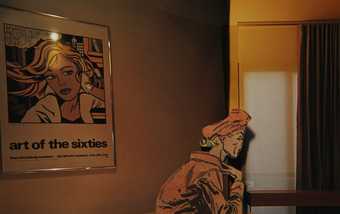Working from his personal archive of found print and sound materials, Lewis Klahr has developed a significant body of analogue and digital stop-motion collage films over the last forty years. Structured into twelve chapters, Sixty Six brings together a number of short works produced since 2002 into a filmic anthology that foregrounds the many visual and aural motifs, obsessions and thematic threads that run through his oeuvre.
The title itself refers to one such motif – the number sixty-six – which is always somehow present in the film, whether through imagery and dialogue drawn from the American energy company Phillips 66 and the television series Route 66, or through references to the year 1966. This provides a general temporal context for much of the pop art, architecture and advertising material from which the film is composed.
Ranging from three minutes to over twenty minutes in length, the film’s twelve chapters comprise an elliptical narrative that takes on the melancholic, nostalgic and poetic characteristics of its composite short films. With titles such as Erigone’s Daughter, Lethe, Helen of T, Saturn’s Diary, Mercury and Ichor, these works invite as well as complicate attempts to read the work through the lens of Greek mythology.
With central characters and backdrops culled from a wide array of genres including comic books, ‘sunshine noir’ literature, Portuguese photo novels and architectural magazines, Sixty Six offers a highly textured, dream-like vision of the iconography of post-war America.
Sixty Six, USA 2002–15, DCP, colour, sound, 90 min
After the screening, Klahr will be in conversation with film scholar Tom Gunning.
About Lewis Klahr
Lewis Klahr (born 1956, United States) is a Los Angeles-based experimental filmmaker. He is known for his uniquely idiosyncratic films, which use found images and sound to explore identity, sexuality, memory and history. Since creating his first film in 1977, his body of work has come to encompass a number of short digital and analogue stop-motion collages, including two feature-length films. Creating a dialogue between cut-and-paste collage, underground and experimental film traditions and the art world, Klahr digs into the heart of American, presenting a counter-pop history of sorts. Klahr’s work has won numerous film awards and was acquired for the permanent collection of the Museum of Modern Art, New York.
Tate Film is supported by LUMA Foundation

